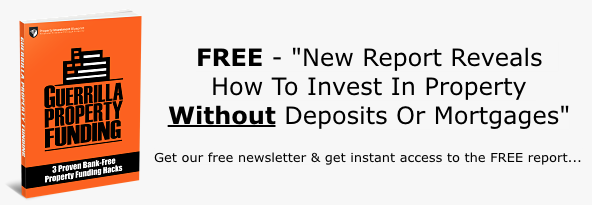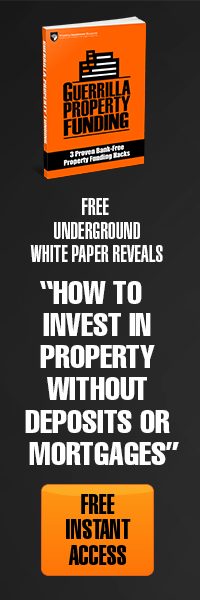
Property Crowd Funding
So what's the big deal with property crowd funding?
Put it this way... My wife and I just adopted our first baby boy and he’s enough of a handful -- I can only imagine what life will be like with a house full of kids, a full time job and any other commitments one might have!
If that sounds like you then I have the perfect way that you can get your “feet wet” with property investing without any of the time-consuming activities that go with it.
You can even shortcut the learning curve because this method allows you to leverage the experience of seasoned property professionals.
Not only that but if you don’t have a huge pot of cash at your disposal, you can get started for as little as £100.
I know you’re starting to think this sounds too good to be true but it’s not: it’s real and it’s called property crowd funding.

How to invest in property using the talents of others for as little as £100
Investing in property looks great from the outside. There is massive potential to earn money from property but to some people there is a major drawback – the fact is that you need a lot of money to invest in property.
To buy a property either to sell on or rent out takes a trip to the bank for a mortgage and a deposit of around 25% of the purchase price. Then there are fees and costs as well, so unless you have access to tens of thousands of pounds then property investment is out of the question for you. Or is it?
Crowdfunding has come to prominence over the last few years as an alternative way for people to raise money for a variety of projects. It is used by individuals and companies to look for money when they can’t or don’t want to approach a bank for a loan. But as it has become more used and trusted, crowdfunding is now seen as just another way to raise money or, more importantly for the budding property investor, a way to invest money.
And this is where the rise of crowdfunded property investment vehicles has come from. You can invest as little as £100 in a property investment and see a return from rental income and capital growth. It’s a great entry level investment for anyone that is interested in starting out in the property investment game.
From a good idea that one or two companies promoted on other crowdfunding websites, we now have an industry of property crowd funding opportunities. There are a huge number of sites out there and the chance to invest in property has never been easier. So, to the investor, you need to know what this is all about. Here is our guide to property crowd funding.

Property crowd funding: how does it all work?
Investing in property is all about research. You may hear stories of people picking up a bargain that lands in their lap but don’t think for a second that this happens very often, if at all, for the average investor. It is all about knowing your market, doing the right research, making contacts and buying wisely.
That is how a property investor makes their money. They buy properties under market value and immediately have a good level of equity in the property. So now we are starting to see that it isn’t just a bit of money that you need to invest in property on its own. You need some time too. You need time to develop these contacts and understand your local market.
But what if you could buy all of this expertise in? Well that is one of the benefits of investing in a crowdfunded property scheme. The people who go out there and buy property on your behalf know their market. They invest in property all day long so they have the right contacts and have done all the homework to see the best deals.
You invest in the scheme and you don’t just buy a share in the property – you are buying the experience and knowledge of the people running the scheme. In exchange for this, the opportunity is packaged up in a way that the managers earn their money in the following way–
- A fee for finding the property which is typically around 5% of the deal size
- A fee for the ongoing management of the property under rent, usually 15% of the rental income
- A fee on sale of the property, which often equates to between 15% and 25% of the increase in capital made since purchase. This is only taken with a successful sale of the property.
So, if they buy well, we as investors will end up making the profits above and beyond this. Management fees for rent as an individual investor will be in and around 10% of the monthly rent and the initial and final fees should be offset by the professional investor that finds a deal that the rest of us probably couldn’t match with minimal time available.
As I said earlier, you are buying in their expertise. They have people who work full-time on sourcing the best deals. This is a great way to get into property investment without the costs and time usually associated with it.

What different types of property crowd funding deals are there?
As you start to do some research on the different property investment crowdfunding sites out there (don’t worry, I will talk you through some of the bigger ones later) then you will see deals that stack up in different ways. Whether you are new to investing or the seasoned investor, you will need to assess the deal being proposed. To understand what these might do for you, there are a few terms in common use that you will want to get used to, or remind yourself of–
Term
This is simply how long your money will be invested for. If it states a 2-year term, for example, then your money must remain in that investment for that length of time.
BMV
This stands for Below Market Value and shows you, based on their research, how much below what it would normally be sold for the opportunity is being bought for. It shows the immediate equity available in a property.
Projected yield
This is simply the amount of income the crowdfunding company expect it to bring in, after fees and taxes. This is your income.
Projected growth
This shows by how much they expect it to rise in value over the term. This is your return on capital at the end of the term. This shows you how much profit you could make.
Obviously, the property market is not static, so the yield and growth are projected figures, not guarantees of return. Once you know these terms, then you will easily be able to spot the type of deals that have been put together. Let’s take a look at what they look like–
Discounted properties
The first type of deal that you will spot is the property that is being bought way under market value. They will have BMV figures of 25% or more typically, and you can see that if the property market remains stable over the term, you will stand to make a good capital return over that period of time. These will also often have shorter terms because the strategy is to buy and then sell on for a profit. The investment company buy a property way under market value, maybe put aside some funds to renovate it, and then get it back on the market again, selling for a big profit. If you invest in one of these then you can expect some capital growth and your money back to reinvest in the future.
High yield properties
The flip side of this (although it doesn’t have to be – keep reading!) is the high yield property. You may notice a lower figure in the BMV column but a very good projected yield from a project. This means that you get a property that will bring in a great rental return. Although the purchase price may not be a long way below the market value – you should still expect some discount – the rental return may be around 10% or higher. The term for these deals may be longer because the strategy here is to get a good rental return, so your investment brings you in income rather than looking to give back capital.
High price growth properties
This is where you can really expect to benefit from the expertise of the investment team behind the property crowd funding platform. They know and research enough about the market to see opportunities that might exist in the future. If they spot an area that is up and coming for one reason or another, then they can buy properties that may have a price below market value and may have a decent enough yield, but the real beauty of these deals is that the property may rise in value significantly over the term.
There are many reasons for an area to suddenly see an increase in value over a sustained period. In the South East of England, Southend-on-Sea has seen sustained growth in house prices since the local airport was developed and turned into a hub for two budget airlines. The impact of Crossrail on house prices along the line are expected to see a big increase as the benefits of being able to get across London quickly are realised. You can see deals on the property crowd funding sites that have a high projected growth figure. They are not infallible, and the market doesn’t always follow predictions, but the fact that the managers of the funds know their property means that they back more winners than losers. You can add some of your own research to find a deal that you are happy with.
It doesn’t have to be one or the other
As I alluded to earlier, these deals don’t always fit into one specific category or another. There is nothing to say that a deal with a great BMV doesn’t also offer a fantastic rental return. Beware of something that offers too much. As more property crowd funding sites come online and try to compete for your investment there is the temptation for these companies to try to outdo each other with bolder claims. But when you are choosing an investment, look at the track record of the companies and have a quick reality check to see if what they are saying seems plausible.

Some slightly different deals
Property investment crowdfunding sites have started to diversify what they offer, so there is more available than the traditional property deals of buy and rent out or buy and sell on. They may be worth considering, so I have included them here.
Private equity deal opportunities
There are some massive property deals put together, especially in London. Some deals are worth tens of millions so are out of the reach of even these investment companies, let alone the likes of you and me. But what the crowdfunders can do is look to take a slice of this deal. They may negotiate a small percentage of the deal, 5% for example, and then offer this to investors via their platform. These are deals that you couldn’t dream of being a part of when you first start out so having access to these can help you to make good money. They often take a lot more negotiation and management, so the fees can be higher, but the potential for return is usually a lot higher too.
Lending money
Some of the platforms have looked at the way they structure their business. They often need some finance to buy property. So, they decided to start offering a chance for the investor to lend them money for a fixed rate of return. So instead of investing in property, you lend the crowdfunder money and they pay you back with interest. It steps away from investing in property, but with rates around 8% it beats anything that the bank will offer you.
Why is this a good thing for an investor?
Investing in a crowdfunded property scheme is a great way to get started if you haven’t done this before. It can get help you to understand the business of investing in property and start the returns that could build into your own portfolio in the future.
But it is not just newbies that should consider property crowd funding for their investment needs. Many of the investors in these crowdfunded deals are experienced investors that know the benefits it can bring.
A couple of years ago I made my own first property crowd funding investment with Property Moose.
To be continued...
This is an extract from John Wilson's new book: "Property Investment Hacking: 13 Ways To Ethically Shortcut Your Way To Financial Freedom In Property In 12 Months Or Less".
For a limited time, you can claim a free copy of the book (just cover P&P).
<< Back to Property Investment Strategy from Property Crowd Funding UK
<< Back to Property Investment Blueprint from Property Crowd Funding



